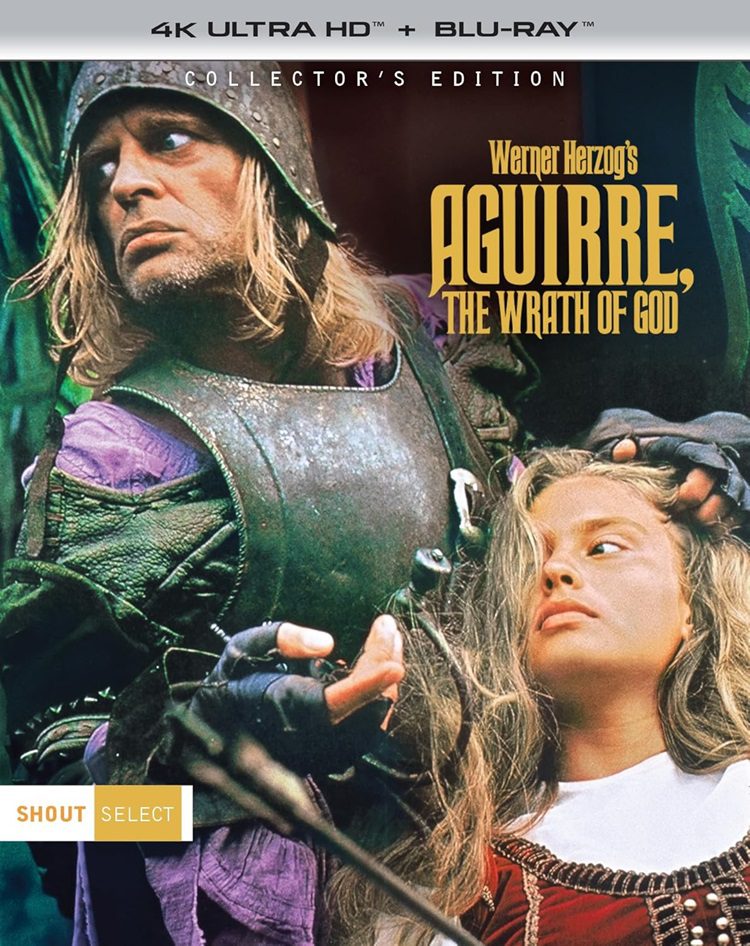
A line of men snakes their way down a mountain, single-file like ants. Some are soldiers all decked out in suits of armor. Some carry swords, others long battle axes. The few women are fitted in long, beautiful dresses made of silk and velvet. Later, we will see them carried in a sedan chair. These are people completely out of place in this Amazonian jungle. Only their slaves appear at home and they are forced to carry the women, the supplies, and even a cannon through the muck and mud, across rivers, and through dense forests.
Buy Aguirre, the Wrath of God – Collector’s Edition 4K Ultra HDThey are Spanish conquistadors searching for the mythical El Dorado, the city of gold. After several days of getting nowhere their leader, Pizarro, declares that a group of 40 men will build rafts and sail down the river. They will return in one week with news of what lies ahead. He chooses Pedro de Ursúa (Ruy Guerra) to lead the expedition with Lope de Aguirre (Klaus Kinski) as his second in command.
Almost immediately, the expedition turns disastrous. One of the rafts gets trapped in eddy forever swirling in circles without ever getting free. The others are unable to help. In the middle of the night, the men decide to commit suicide rather than starve to death floating in circles. That morning the rest of them find the remaining rafts have disappeared. The rising river water took them away.
Pedro de Ursúa declares their time is up and they should return to Pizarro. Aguirre disagrees and leads a coup against him. He declares another man, the nobleman Don Fernando de Guzmán (Peter Berling), as their leader, deciding to remain second in command. They formally secede from Spain declaring a new empire of El Dorado with Guzmán as their emperor.
They build a new raft and continue down the river. Their hardships follow. Natives regularly attack them from the shadows of the jungle. Food is scarce. Rapids come quickly and with a ferocity that nearly overturns them. Disease and delirium overcome them. Still, they trudge on. Aguirre assures them El Dorado is just around the corner. It is clear by this point that he is mad, but there is nothing for them to do. To try and leave can only mean death.
Their emperor is not much better. In one scene, he is fed plates full of berries and cooked fish while his men divvy up only a handful of seeds. When their one horse startles him, he orders it be thrown off the raft, leaving it to die a horrible death. His men note that the horse was of great military use, or at the very least it could have fed them for a week.
Aguirre, the Wrath of God was director Werner Herzog’s fourth feature film and it made him an international star. It contains many of the themes he would be obsessed with throughout his career – the beauty and unforgiving apathy of nature to humankind, the madness of men, and ambitious men with impossible dreams of grandeur. These themes often reflect the nature of Herzog himself. This is one of many films in which the director faced impossible odds and incredible hardships. Hardships the director essentially caused himself.
They spent five weeks shooting in the Peruvian rainforest, climbing mountains, cutting through heavy vines and foliage, and sailing down treacherous river rapids all the while lugging heavy cameras and equipment – actions that must have mirrored the fictional conquistadors of their film. Famously, Herzog and Klaus Kinski did not see eye to eye during the shoot with Kinski’s angry outbursts disturbing both cast and crew. Kinski felt that Aguirre should be played with ferocious anger and as a wild madman while Herzog felt he should be quieter, more thoughtful, and menacing. Herzog would later say that he would intentionally infuriate Kinski then let him rant and rave until he had tired himself out. Only then would he roll the cameras. In a moment that has since become the stuff of legend, Herzog threatened to shoot Kinski and then himself if Kinski didn’t behave.
The end results are nothing short of brilliant. Kinski plays Aguirre with a quiet intensity. For the first act of the film, he is mostly seen in the background yet he still seems larger than life. His Aguirre is quiet, but always thinking, and plotting. Once he overthrows Ursúa, his true madness comes out. At one point, he declares he is the “wrath of God,” and “the earth I pass will see me and tremble.”
Herzog films it in a cinema verite style. The camera is with them, on the river, on the boat. It acts like an observer. It is a fly on the wall, or rather in the jungle. There are few complicated shots. The music is mostly dietetic; the haunting score comes in rarely, but when it does it is effective. There isn’t a lot of action, but Herzog infuses it with a foreboding sense of dread. We know these people are doomed. They know it too. Well, everyone except Aguirre, who truly seems to think he will find El Dorado and conquer the world. We sail down that river with them, our destinies intertwined.
Aguirre, the Wrath of God is a great film; a mystical, haunting vision of a madman. It is strikingly beautiful, elegiac, and mesmerizing. Shout Factory presents the film with a new 4K UHD transfer from the original 35 mm negative. It looks magnificent, with an understanding that because it was shot deep in the jungle without any type of lighting setup it doesn’t always look pristine or clean, but it always looks good.
The extras are as follows:
- Audio Commentary With Writer/Producer/Director Werner Herzog
- Audio Commentary With Werner Herzog, Moderated By Lauren Straub (In German With English Subtitles)
- Theatrical Trailer
- Still Gallery